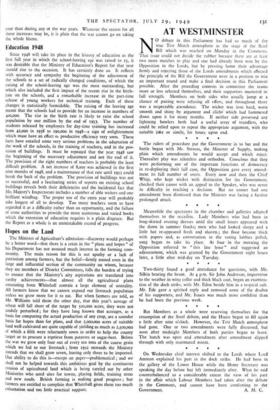AT WESTMINSTER
N. debate in this Parliament has had so much of the true Test Match atmosphere as the stage of the Steel Bill which was reached on Monday in the Commons.
That issue could not decide the rubber because there are at least two more matches to play and one had already been won by the Opposition in the Lords, but by pressing home their advantage firmly and rejecting those of the Lords amendments which affected the principle of the Bill the Government were in a position to win an important round and make a final decision in this Parliament possible. After the preceding contests in committee the teams more or less selected themselves, and their supporters mustered in full strength. Members on both sides who usually jump at a chance of pairing were refusing all effers, and throughout there was a respectable attendance. The wicket was iron hard, worn smooth and shiny by argument and cliche which had hammered down upon it for many months. If neither side possessed any lightning bowlers both had a useful array of trundkrs, who could be relied upon to repeat the appropriate argument, with the suitable joke or simile, for hours upon end.
* * * * The rulers of procedure put the Government in to bat and the battle began with Mr. Strauss, the Minister of Supply, making plain which amendments he would accept and which reject. Thereafter play was relentless and orthodox. Conscious that they were performing one of the important functions of democracy in re-deploying their full case, the Opposition gave every amend- ment its full number of °vers. Every now and then the Chief Whip, who kept wicket with distinction for the Government, checked their career with an appeal to the Speaker, who was never in difficulty in reaching a decision. But no sooner had one amendment been dismissed than the Minister was facing a further prolonged attack.
* * * * Meanwhile the spectators in the chamber and galleries adapted themselves to the occailon. Lady Members who had been in long-skirted evening dresses until the small hours appeared with the dawn in summer frocks; men who had looked sleepy and a little hot re-appeared fresh and shaven ; the floor became thick with papers and, as conversation in the voting lobbies palled, song began to take its place. At four in the morning the Opposition referred to "this late hour" and suggested an adjournment, which was granted by the Government eight hours later, a little after mid-day on Tuesday.
• Two-thirty found a good attendance for questions, with Mr. Silkin bearing the brunt. At 4 p.m. Sir John Anderson, impervious to the weather in wing collar and thick black coat, began an examina- tion of the dock strike, with Mr. Eden beside him in a tropical suit. Mr. Ede gave a spirited reply and removed some of the doubts of his supporters, and Mr. Isaacs was much more confident thati he had been the previous week.
But Members as a whole were reserving themselves for the resumption of the Steel debate, and the House began to fill again a little after nine o'clock. However, the Test Match atmosphere had gone. One or two amendments were fully discussed, but soon after midnight Members of both parties began to leave. The hutch was open and amendment after amendment slipped through with only murmured assent.
ft
On Wednesday chief interest shifted to the Lords where Lord Ammon explained his part in the dock strike. He had been in the gallery of the Lower House while the Home Secretary was speaking the day before but left immediately after. What he said counterbalanced to a considerable extent the view of his part in the affair which Labour Members had taken after the debate in the Commons, and cannot have been comforting to the


































 Previous page
Previous page